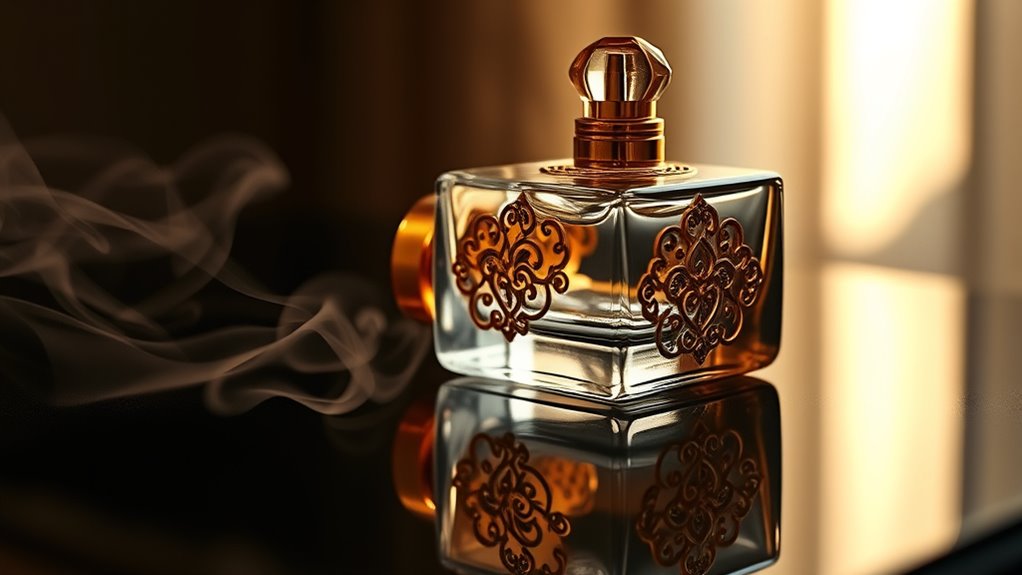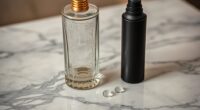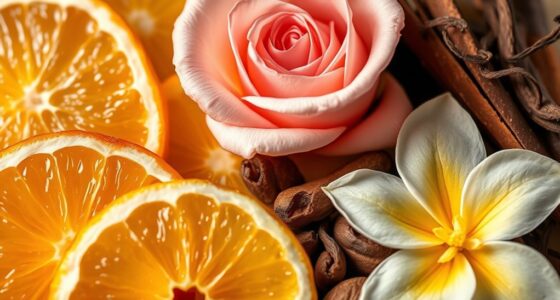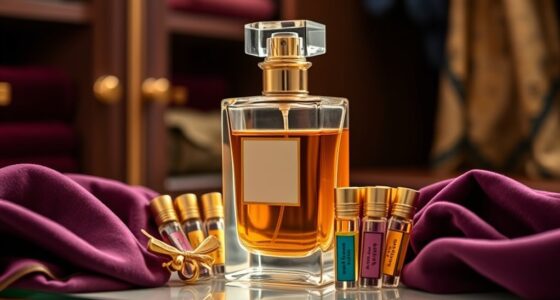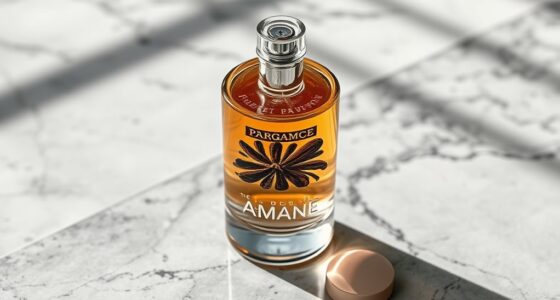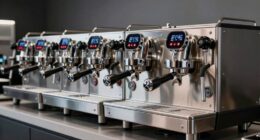Many luxury fragrances don’t last as long as their labels claim because brands often reformulate formulas, hide ingredient changes, and focus on projection over longevity. Your skin chemistry, application methods, and environmental factors also greatly influence scent duration. Packaging and branding can create the illusion of longer-lasting perfume, but true performance varies. To discover what brands don’t tell you about perfume longevity, explore how formulation tweaks and marketing tactics impact your scent’s wear time.
Key Takeaways
- Higher fragrance concentration doesn’t guarantee longer wear; reformulations and ingredient choices impact longevity regardless of label.
- Luxury brands often keep formulation details secret, making true scent durability difficult to assess or compare.
- Modern reformulations may prioritize projection over longevity, reducing scent persistence over time.
- Application method, skin chemistry, and environmental factors significantly influence how long a perfume lasts.
- Perceived longevity is influenced by packaging, branding, and presentation, which can create illusions of longer-lasting scents.
Debunking the Myths Surrounding Concentration Labels
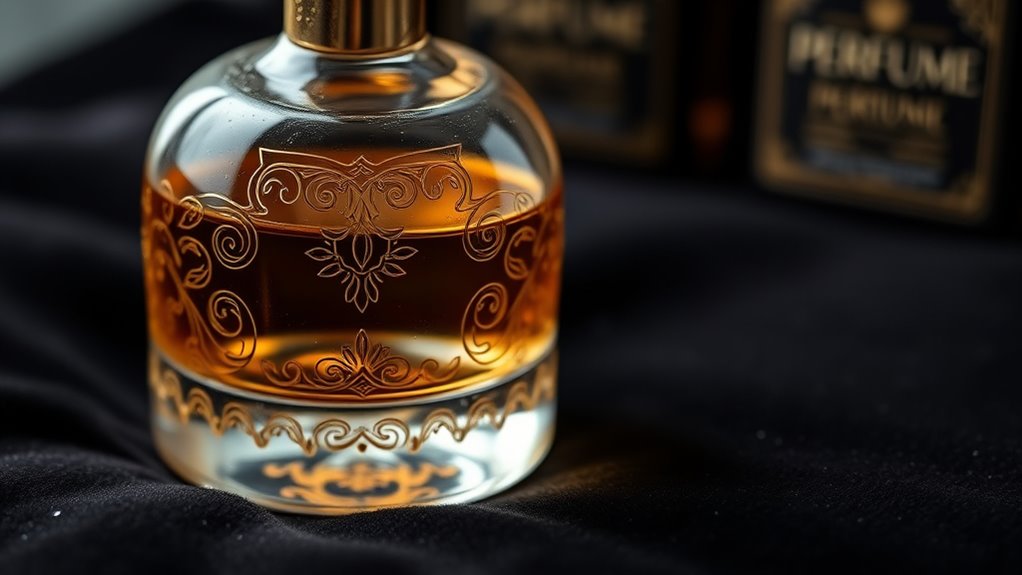
Many people believe that a higher perfume concentration automatically means longer-lasting scent, but this isn’t always true. Labels like eau de toilette or extrait de parfum are mostly marketing terms and don’t reliably reflect the actual oil percentage or longevity. While higher concentrations often produce richer, more intense fragrances, they don’t guarantee longer wear. Reformulations and modern production methods have also shortened longevity, regardless of concentration labels. Plus, your skin chemistry, how you apply the perfume, and environmental factors influence how long a scent lasts more than the concentration itself. Experts suggest trusting your nose and personal experience over concentration labels, which can be misleading or vary widely across brands. Don’t rely solely on the label—focus on how the perfume interacts with you. Additionally, understanding perfume concentration can help you make more informed choices about scent longevity. Recognizing the impact of fragrance formulation and how reformulations affect longevity can help you better select scents suited to your preferences.
How Application Methods and Skin Chemistry Affect Longevity
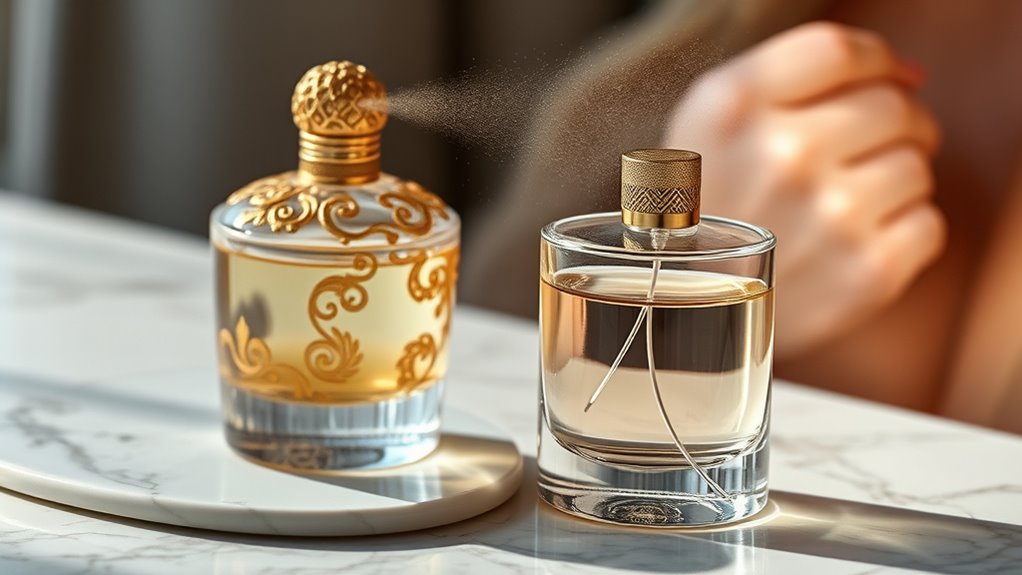
How you apply perfume and your skin chemistry play significant roles in how long a scent lasts. Application methods matter—spraying onto clothes can make scents linger longer because fabrics retain fragrance differently than skin. However, applying directly to your skin allows the scent to interact with your unique skin chemistry, which influences longevity. Factors like pH level, oiliness, and hydration determine how well a fragrance develops and persists. Warmer areas like wrists, neck, and chest promote longer-lasting scents due to increased blood flow and temperature. Proper moisturization before applying perfume creates a better base for scent molecules to adhere to, extending wear. Conversely, dry skin can cause fragrances to fade quickly. Essential oil safety knowledge can help you choose skin-friendly fragrances and avoid potential irritation. Additionally, understanding skin chemistry can help you customize your perfume application for optimal longevity. Recognizing how application techniques affect scent dispersal can also enhance how long your fragrance lasts. Using proper storage methods for your perfumes can prevent deterioration and maintain their potency over time. Being aware of fragrance composition can further guide you in selecting scents that are more compatible with your skin chemistry, helping to maximize their longevity. Understanding how application methods and skin chemistry work together helps you optimize your perfume’s staying power.
Reformulations and Their Impact on Fragrance Durability
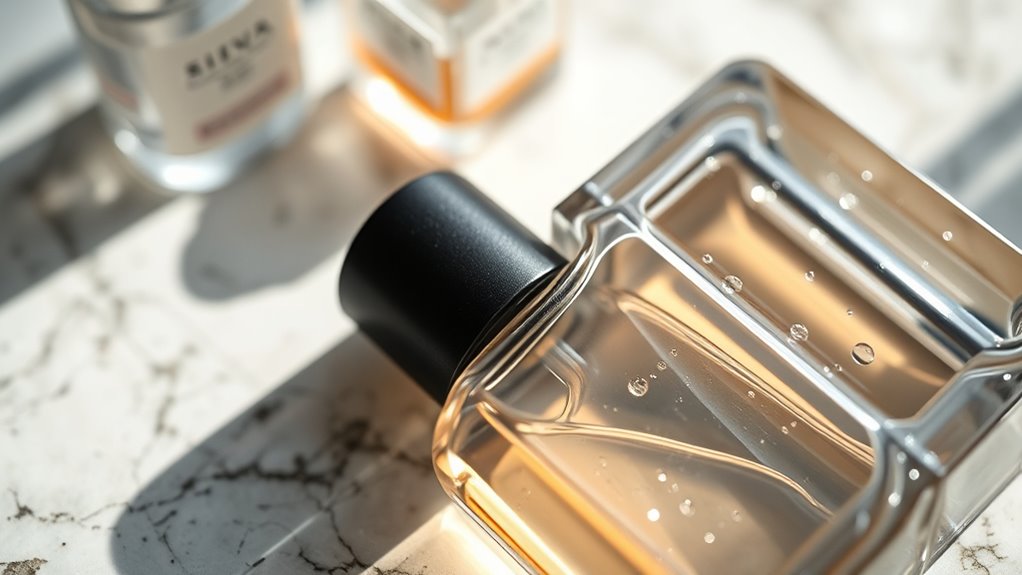
Reformulations of perfumes can substantially influence their fragrance durability, often in unexpected ways. When brands tweak formulas—adding ingredients like bergamot to Eau d’Hadrien, for example—they can change scent perception and how long the perfume lasts on your skin. Surprisingly, recent reformulations often result in shorter-lasting versions, even with higher concentrations, defying expectations. Changes in ingredient sourcing and formula adjustments over time can also lead to noticeable differences in longevity and scent profile. Some reformulated fragrances are redesigned to emphasize initial projection rather than long-term wear, affecting overall durability. Typically, vintage or original formulations tend to last longer and remain more consistent than modern reformulations, which might prioritize cost-cutting or compliance. These reformulations directly impact how long your perfume endures throughout the day, and understanding reformulation impacts can help consumers make more informed choices. Additionally, fragrance composition plays a crucial role in determining scent longevity and how it evolves over time. Variations in ingredient sourcing can alter the stability and evaporation rates of certain components, further influencing longevity. Being aware of regulatory changes is also important, as legal restrictions can lead to reformulations that affect fragrance longevity. Moreover, formulation stability can be compromised by environmental factors like temperature and storage conditions, further affecting how long a perfume lasts.
Variability in Perfume Performance Across Different Concentrations
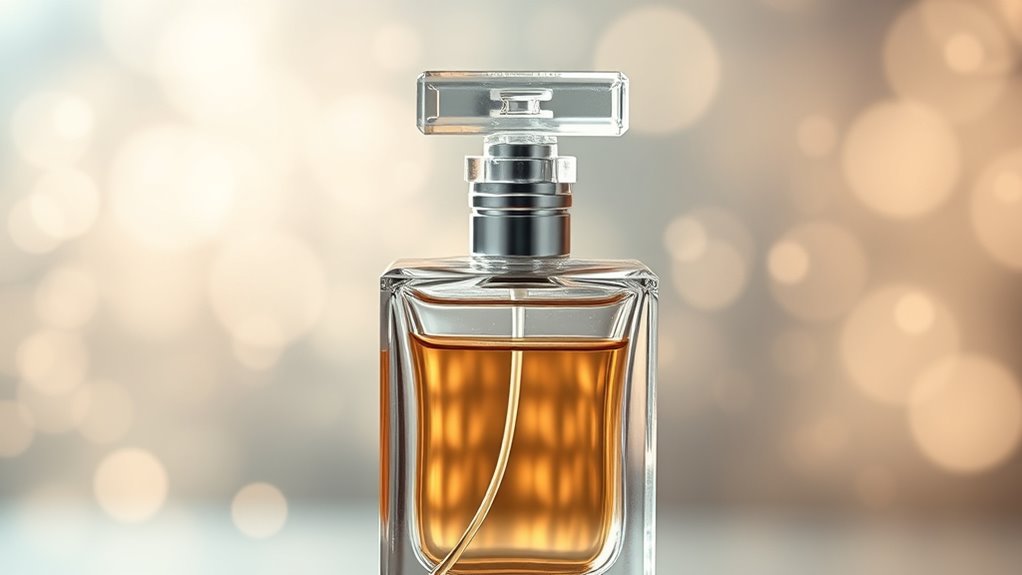
Perfume performance across different concentrations can vary markedly, even when the bottles share the same name. You might assume higher concentration always means longer longevity, but that’s not always true. Factors like formulation changes, skin chemistry, and application method influence performance, projection, and wear. Here’s what to contemplate:
Perfume performance varies by concentration due to formulation, skin chemistry, and application.
- Formulation Differences: EDPs, EDTs, and extrait can smell like entirely different scents, with variations in richness and dry-down behavior.
- Longevity Variability: Increasing oil content doesn’t guarantee longer wear; reformulations and ingredient quality affect how long the scent lasts.
- Projection and Performance: Higher concentrations can sometimes fade quickly or have weaker projection, depending on how the perfume interacts with your skin and application area.
- Understanding Formulation Types helps in selecting the right concentration for your desired scent experience.
The Influence of Packaging and Presentation on Perceived Longevity
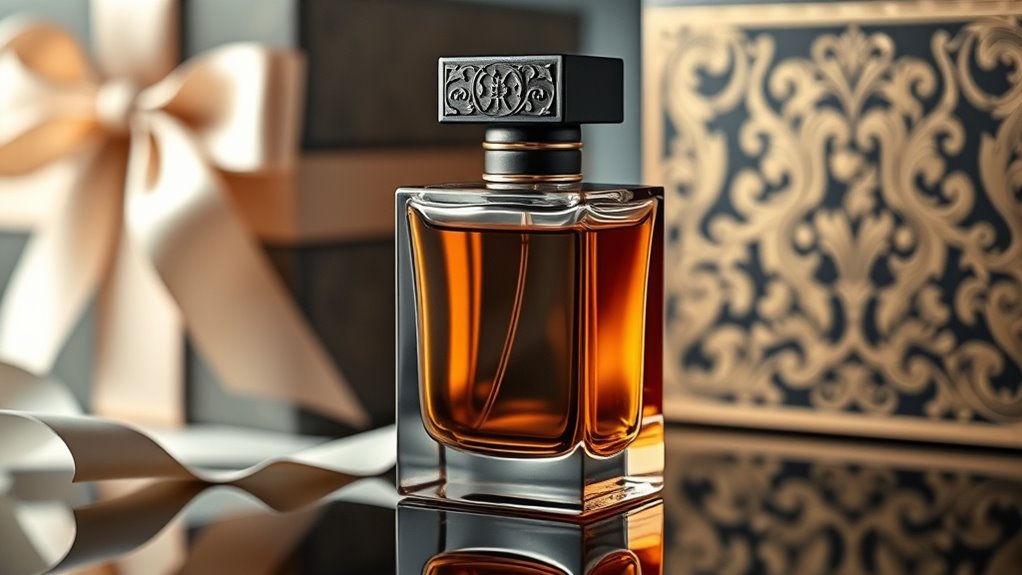
The way a perfume is packaged and presented can considerably influence how long you believe it will last on your skin, even if its actual longevity hasn’t changed. Luxurious packaging, like elaborate bottles and high-end boxes, boosts perceived scent durability. Premium materials and intricate designs justify higher prices and create the impression of lasting power. Visually appealing and tactilely satisfying packaging can reinforce the idea of a long-lasting fragrance. Limited edition bottles or unique presentation formats evoke exclusivity, leading you to assume they last longer. Your perception is influenced by how the perfume is displayed and marketed. Additionally, packaging features such as unique caps or textured surfaces can enhance the overall impression of durability and quality. The design of the packaging can also reflect the fragrance’s longevity, subtly influencing consumer expectations. This connection between visual cues and perceived performance is similar to how branding strategies influence consumer perceptions across various products. Moreover, marketing campaigns often emphasize the luxury appeal, which can further reinforce the idea of enduring scent performance. In some cases, the choice of packaging materials can also impact the scent’s diffusion and perceived strength, further shaping consumer impressions.
What Luxury Brands Don’t Tell You About Fragrance Longevity

Luxury brands often keep details about their fragrance formulations under wraps, even as they make subtle changes over time. This lack of transparency influences your understanding of true longevity. Here’s what they don’t tell you:
- Reformulations often reduce longevity, even in higher concentration scents, to cut costs or adapt to market trends.
- The labeled concentration (like EDP) doesn’t guarantee longer-lasting scent; formulation tweaks can alter performance.
- Price and branding influence your perception of longevity, but actual scent performance varies due to secretive ingredient sourcing and production changes.
- Factors such as formulation stability and ingredient quality can significantly impact how long a fragrance lasts on the skin. Additionally, ingredient sourcing often varies, affecting scent longevity unpredictably.
Without official sampling options, evaluating true longevity before buying is tricky. Keep in mind, your individual chemistry and tiny formulation adjustments play a bigger role in scent evolution than concentration labels alone.
Frequently Asked Questions
Do Luxury Perfumes Last Longer?
You wonder if luxury perfumes last longer, but it’s not always the case. Higher concentrations like EDPs tend to last longer, but reformulations and your skin chemistry can change that. Some luxury scents focus on projection and complexity rather than longevity, so they might fade faster than expected. Don’t assume a high price guarantees all-day wear; actual performance depends on ingredients and how your skin interacts with the perfume.
Which Luxury Perfume Lasts the Longest?
If you’re wondering which luxury perfume lasts the longest, you might want to try Amouage Interlude Man or some Tom Ford Private Blend scents. These fragrances are known to stay on your skin for over 12 hours, but remember, longevity varies based on your skin chemistry, how you apply, and the environment. Vintage versions often last longer because of different ingredients, so consider that when choosing your signature scent.
Why Does My Expensive Perfume Not Last?
You might wonder why your expensive perfume doesn’t last, even with its price tag. The truth is, high cost doesn’t guarantee longevity. Reformulations, ingredient choices, and your skin chemistry all play a role. Plus, some luxury brands prioritize scent complexity over lasting power. To improve, try applying to pulse points, moisturize your skin beforehand, and choose fragrances with higher oil concentrations. Don’t expect your perfume to linger forever—enjoy its evolving scent instead.
Can People Tell the Difference Between Cheap and Expensive Perfume?
You might wonder if people can tell the difference between cheap and expensive perfume. In most cases, they can’t, since scent alone isn’t enough. High-end fragrances often rely on branding and packaging to seem superior, but the actual scent and lasting power can be similar across price ranges. Unless you’re an expert, you probably won’t notice subtle nuances, so don’t stress over the price—what matters is how it makes you feel.
Conclusion
Ultimately, what you experience with a perfume often hinges on little surprises—your skin’s chemistry, how you apply it, or even the bottle’s design. Sometimes, a scent that’s meant to last all day might fade faster than expected, reminding you that fragrance isn’t just about luxury labels. It’s these small, unexpected moments that make discovering your perfect perfume feel like a personal journey—one filled with both secrets and serendipity.
